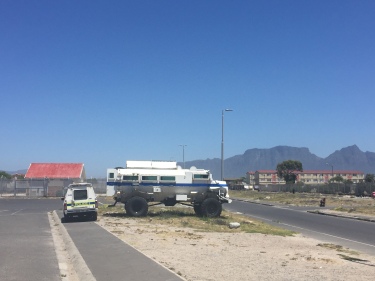Gang violence in Cape Town has been described as reaching ‘crisis point.’ Cape Town is regularly listed as one of the world’s most violent cities, and the most violent city outside of the Americas.
The state response to violence in Cape Town has taken place at three levels: through city authorities, through the province, and through the national government. These responses have covered a wide range of approaches, from heavily securitised crack-downs and military deployments to community-engagement initiatives.
To date there has been little sustained progress in reducing violence. A Cure Violence-based public health programme trialed in one township has claimed some successes, but these claims are strongly disputed. There has been no independent comparative evaluation of this programme or other interventions. With limited systematic analysis of violence reduction initiatives or coordination of cross-community efforts, politicians and communities have regularly called for robust military deployments to address gang-violence, a problem widely seen as driven by the drug trade. In 2019, South Africa’s army was deployed to gang hot-spots.
My Research

Working with local organisations, researchers, and former gang-members, my research in Cape Town gives particular focus to the communities of Manenberg and Hanover Park, notorious for high-levels of gang violence. Both communities have experienced recent military deployments and Hanover Park has been the site for a Cure Violence-based violence reduction initiative, named Ceasefire. To date, I have conducted fieldwork in 2016, 2017 and 2018, documenting the impacts of these interventions among others, and carrying out in-depth interviews with gangs, perpetrators of violence and community members. Ongoing remote research during Covid-19 has been conducted via WhatsApp and through coordination with local research partners, including The Safety Lab. During 2017-2018 I was a Visiting Associate at the Safety and Violence Initiative at the University of Cape Town.
As in the other cities of this research project, the aim is twofold:
1) to better understand what drives violence in Cape Town, so that 2) better responses can be devised.
My research does this both by bringing to bear lessons that can be learned from other contexts – for example from Rio’s own experience of security-centred interventions – and by providing extensive new findings based on original interviews with gang-members, community members, non-governmental organisations, and various other stakeholders.
The research in Cape Town is part of an ongoing comparative project that forms the basis for six forthcoming journal articles and a book-project exploring marginalised youth and urban violence around the world
Header image: Youth in Manenberg take part in a football match over the Christmas holidays in one of the most violent streets of the community – part of a scheme designed by local residents to reclaim the streets. Photo credit Jonathan Jansen, Manenberg, Cape Town, January 2018.